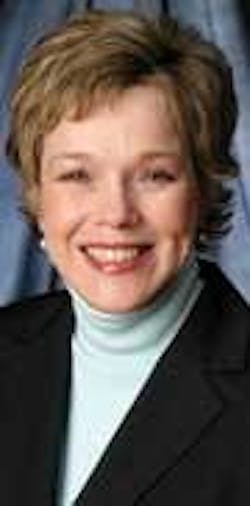‘Learn, unlearn, and relearn’
Evidenced-based decision making in patient care is one of the emerging trends in dental hygiene care, as well as in periodontal disease prevention and treatment. Along with EBD, determining a patient’s risk factors, host-modulation and the role that the plaque biofilm plays, are all integral aspects of current dental hygiene treatment. Are you aware and educated about all of these current concepts? If not, then Carol Jahn RDH, MS, has a program titled “Achieving excellence in dental hygiene care: The periodontal patient.” This course is designed to provide the dental hygienist with the tools necessary for playing a key role in the achievement of successful outcomes for periodontal patients.
Carol describes the course as a “soup to nuts” course in periodontology. She reviews the basics of perio: assessment, treatment, adjunctive therapies and self-care modalities. She then delves into the emerging trends of biofilm, host modulation, and the link to systemic disease. In another program, “Treating individuals with diabetes: What oral health-care providers need to know,” she expands on some of these concepts. Both programs center on two major themes: knowing the evidence that exists for the practice of dental hygiene and implementing that evidence in a tailored approach that is specific to the needs of each patient.
Anyone who is looking for a comprehensive review of periodontal infections, especially one that covers risk assessment and other cutting-edge information, would benefit from taking the perio program. Risk assessment entails considering a person’s likelihood of developing a periodontal problem, based on a number of factors. In the diabetes program, Carol expands on the role of periodontal disease and its systemic relationship to diabetes and other systemic problems. It proves to be a great eye-opener, both professionally and personally. Although the programs are geared toward hygienists, all dental team members can benefit. How can a hygienist implement a program within her/his office if all of the team members are not “on-board” with the plan? Change is much easier if everyone with a vested interest is present and can have initial buy-in to the new ideas or concepts that are being presented.
Course objectives for the periodontal program include:
• Utilizing clinical evidence; practitioner experience and patient preferences in decision making
• Formulating an appropriate dental hygiene diagnosis
• Identifying critical risk factors for periodontal disease, and implementing findings in patient evaluation and assessment
• Locating appropriate evidence-based resources for use in daily clinical practice
• Evaluating and implementing local delivery and host-modulation products as adjunctive therapies
• Recommending appropriate self-care products, and techniques.
The objectives of the diabetes program expand on the perio objectives, but also include:
• Developing office protocols for managing patients with diabetes
• Comparing and contrasting non-surgical periodontal treatment modalities
• Reviewing diabetes classifications and oral manifestations of the disease
• Relating heart disease and smoking to the periodontal-systemic connection.
Carol became interested in developing periodontal programs after practicing for nine years in a periodontal practice. She has been the educational programs manager for Waterpik Technologies for the past eight years. Initially, she presented programs to dental hygiene schools, but now is primarily involved in providing courses to practicing dental professionals. She received her bachelor’s in dental hygiene from the University of Iowa, and her master’s in continuing education and training management from the University of St. Francis. She became involved in public speaking as president of the Illinois Dental Hygienists’ Association. That experience led to her involvement with Waterpik Technologies.
Carol does provide handouts in her programs, but they are not detail-oriented. She feels that sometimes people get bogged down in the details and don’t see the “forest for the trees,” so she relies on her handouts for the take-away messages that she wants her participants to have.
The majority of hygienists who take her programs appreciate hearing the scientific evidence that her programs provide. Hygienists are intelligent, educated professionals and enjoy being treated as such by presenters. She also tries to apply the scientific evidence through practical examples, so that everyone can experience this learning method.
She is committed to a healthy lifestyle because she believes it is important for people working in health care to be positive role models for total health, and not just oral health. She tries to work out several times a week and likes to cook. She always makes time for family and friends, belongs to two book clubs and recently took up knitting. She finds the rhythmic nature of knitting to be relaxing. If she were not a hygienist, journalism would suit her well, since she loves to write and loves getting the story right, from an informational and evidence-based perspective.
Carol is a lifelong member of ADHA and has served on many levels, from component and constituent president, to her current position as ADHA Treasurer. It concerns her to see the numerous barriers that hygienists must overcome to continue to grow and thrive.
Carol enjoys helping dental hygienists understand that research isn’t just a stuffy, boring journal article that provides a cure for insomnia, but that it is a dynamic, evolving component of practice that can lead to excellence in dental hygiene care. Clinicians realize that the literature can be a friend or a conduit to change. She recently read that “success for today’s society will come from being able to learn, unlearn, and relearn.” Continuing education is the linchpin in that process.
For more information on Carol’s programs, contact her at (800) 525-2020, ext. 8565 or via email at [email protected].
Ann-Marie C. DePalma, RDH, BS, is currently a faculty member at Mt. Ida College’s dental hygiene program after spending more than 25 years in private practice. She is also pursuing a master’s degree in education in instructional design. A member of several professional dental hygiene associations, Ann-Marie has written numerous articles and provides continuing education programs for dental hygienists and dental team members. She can be reached at [email protected].

